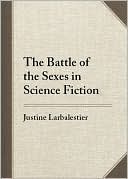

 |

|

The average rating for The Battle of the Sexes in Science Fiction based on 2 reviews is 4 stars.
Review # 1 was written on 2018-09-29 00:00:00 Jared Canon Jared CanonThe book sacrifices part of its amenity for the rigor of the thesis that it exposes, it is a more academic work than a journalism one, for example a bit monotone in some moments. However, Justine Larbalestier does a good job to explain to us the discrimination against women in the history of science fiction (as women writers, as women readers/fans and also as women characters inside the stories) from the perspectives of: feminist theory, literature, culture, semiotics and content analysis. In general, the feminist revolution of the seventies - and the new wave, and those the successive evolutions of the genre - show that, fortunately, there is not a single definition of science fiction and that it is a genre in which everyone has a place. |
Review # 2 was written on 2009-01-05 00:00:00 John Stapleton John Stapleton"The Battle of the Sexes in Science Fiction" by Justine Larbalestier is the fourth book in the Early Classics of Science Fiction series from Wesleyan University Press, and is unlike any of the other books in the series up to this point. The previous books in the series included whole works of science fiction along with supplementary material. This book is a study of the history of science fiction with respect to women as fans and authors. Justine Larbalestier looks at the period starting in the mid 1920's and continuing up to today. She limits her look to that period, because that is when the genre of science fiction was first identified, and because the 1920's are the starting point for the pulp magazine publications of science fiction. The book covers the portrayal of women in the stories themselves, and how poorly they were written by the male writers and how the male fans objected to the inclusion of female characters. It also covers the female fans and how their letters were treated compared with their male contemporaries. Ms. Larbalestier also talks about the women authors, how there is a perception that they didn't appear on the scene until the late 60's, and the reaction to their stories by fans, other authors, and editors. Lastly, she spends a great deal of space discussing James Tiptree Jr. (i.e. Alice Sheldon) and the award named after him/her. In the stories from the earlier days, the female characters were mostly included to be saved, or purely as a diversion from the meat of the story. The objections of the male fans to these characters thus seemed reasonable to them and the editors, but at the same time they seemed unable to accept the idea that female characters might actually be central to the stories. It is amazing to think that the idea of women as scientists or astronauts would be more unbelievable than the aliens and civilizations which were portrayed in many of the early science fiction stories. Women were clearly seen as a threat to the male dominated genre. One area which is not talked about is the effect of science fiction being dominated by the pulps and shorter fiction. She does not mention or discuss the dynamic of female characters from the few longer works from the early days. The fan letters are at the same time humorous, for how they sound today, and upsetting, for the sexist ideas which many of them contain. Some of the male fans of the time went on to become authors, such as Isaac Asimov, Ray Bradbury, and others. Equally surprising are the responses from the editors, who patronize the few female fans who take the time to write in, although I do think that Ms. Larbalestier sometimes reads more into their responses than is actually there. However, in many cases when I initially thought this, I changed my mind after trying to view the situation from another viewpoint. When discussing the presence of women authors, I can only agree with her conclusions based on my experience. I have been reading a lot of science fiction from that period, and there were several woman authors from the early days of science fiction, and their stories fit right in with those by male authors. The idea that there weren't any, or that their stories are easily identifiable as being by a woman is ridiculous, although I suppose that their ability to write believable female characters might be a give away in some cases, but then again there are some male authors who were able to do that. The discussion of James Tiptree Jr., is a little too long in my opinion; it feels a little repetitive as she already discussed some of the same things earlier in the book. There is a large amount of detail in the discussion of the award which, though interesting within their context, seem out of place with regard to the rest of the book. These problems are small though, and there are few weaknesses in this very interesting discussion of women in science fiction, and the reaction from the male fans, writers, and editors. |
CAN'T FIND WHAT YOU'RE LOOKING FOR? CLICK HERE!!!